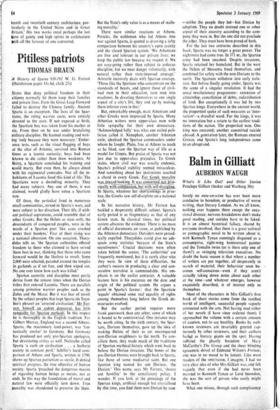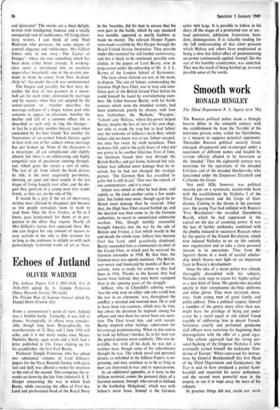Balm in Gilliatt
AUBERON WAUGH
What's It Like Out? and Other Stories Penelope Gilliatt (Seeker and Warburg 30s)
Surely no mise-en-scene has ever been more conducive to boredom, or productive of worse writing, than literary London. As we all know, nothing ever happens there except the occa- sional divorce; nervous breakdowns don't make good reading, and suicides have to be faked. It is an almost hysterical fallacy, shared by everyone involved, that there is a great satirical or pornographic novel to be written about it, with Kenneth Tynan cunningly disguised as a consumptive, right-wing homosexual painter and the Tomalin twins (or is there only one of them?) as swinging television executives. No doubt the basic reason is that where a number of writers are put together, all desperately in search of material, their behaviour soon be- comes self-conscious—even if they aren't actually taking down notes about each other at the time—and whatever emerges, however exquisitely described, is of interest only to themselves.
Most of the characters in Mrs Gilliatt's first book of short stories come from the rarefied world of intelligent, successful people vaguely connected with the arts. Not having read either of her novels (I have since ordered them), I approached the volume with a certain amount of caution, not to say hostility. Books by well- known reviewers are invariably greeted rap- turously by other reviewers, and their authors hailer,] as literary giants on the spot. Having suffered the ghastly boredom of Mary McCarthy's The Group and the sheer blinding egocentric drivel of Edmund Wilson's Prelude, one was in no mood to be lenient. Like most readers of the SPECTATOR, I imagine, I had no very clear idea of who Mrs Gilliatt was, and felt vaguely that even if she had .never been married to Kenneth Tynan or Lord Snowdon, she was the sort of person who easily might have been.
What one misses, through such complacency and ignorance! The stories are a shetetielight, written with intelligence, humour and a totally unexpected vein of recklessness. Of living short- story writers, I can think of only Noel Blakiston who possesses the same degree of control, elegance and ruthlessness. Mrs Gillian falters only in one story—'The Tactics of Hunger'—where she tries something which has been done rather better already. A working- class suitor is introduced into an eccentric upper-class household; one of the parents pre- tends to think he comes from New Zealand. Déjà In? No doubt the crib was unintentional.
The longest and possibly the best story de- scribes the love of two partners in a music- hall act for each other, destroyed by marriage and by success, when they are adopted by the colour-section set. Another describes the marriage collapse of a bogus nature poet who consents to appear on television. Another the decline and fall of a customs officer (he is described as such only to ring the changes— in fact he is plainly another literary type) when cuckolded by his best friend. Yet another the frustrations of an earnest female literary agent in love with one of her authors whose marriage has just broken up. None of the characters is a stereotype; all are complicated and slightly absurd, but there is an exhilarating and highly congenial vein of pessimism running through- out, which gives the stories a sort of unity. The last of all, from which the book derives its title, is the most exquisitely pessimistic, showing an aged and ideal couple in the last stages of living happily ever after, and the dis- gust they generate in a young man who stands firmly, as they say, on the side of life.
It would be a pity if the art of short-story writing were allowed to disappear just because so few people nowadays seem to want to read them. Only the New Yorker, so' fhi'lls I know, pays handsomely for • their', or in pro- portion to the effort they require. Nearly all Mrs Gilliatt's stories first appeared there. But one can forgive her any amount of success or easy acclaim in her role as film reviewer for as long as she continues to delight us with such painstakingly fashioned works of art as these.



































 Previous page
Previous page